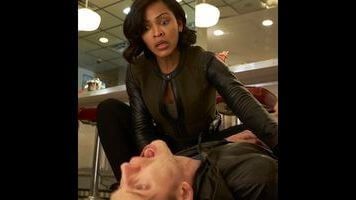
It’s hardly fair to compare a television pilot with a big-budget, Tom Cruise-starring science-fiction film, let alone one directed by Steven Spielberg. But there’s no avoiding the comparison, and so far Minority Report—a sequel to the 2002 blockbuster—doesn’t shy away from its flashier predecessor. More’s the pity: A little extra distance might have taken some of the sting out of the pilot’s shortcomings.
That’s not to say that the series doesn’t have promise. After an awkward recap of the events of the movie—sort of a “previously on” for a show that hasn’t been previously on anything—the show leaps right into a cold open that’s as instructive as it is gripping. A good pilot does more than hook its audience. It also finds a way to teach viewers how to watch, and for a solid six minutes, Minority Report knocks both responsibilities out of the park.
Dash (Stark Sands), a once-and-former precog, races across the city to stop one of the many murders he sees in his mind. As he runs, glimpses of the D.C. of the future peek out: tour buses with educational windows, public transit paid for through facial recognition, and so much video that Times Square might seem tranquil by comparison. His watch ticks down, and even when it seems like he might succeed, there’s a glint in his eyes that says he knows he won’t. It’s clear, surprising, honest storytelling, and just like that, the world—and its ostensible hero—are crystal clear. As time runs out, he turns away in defeat, the victim he tried to save sails out a window to her death behind him. It’s not something Dash needs to see. After all, he’s seen it already.
It’s a sequence worth savoring, and not just because it’s great. The episode doesn’t come close to reaching those heights again, so it’s worth enjoying while it lasts. After only another two minutes or so, all the subtlety and intelligence fly out the very same window and land with a thud louder than any sandbag (or body).
The first crime scene with Lara Vega (Meagan Good), the show’s resident no-nonsense detective, starts promisingly enough. What the scene lacks in originality it makes up for in flash, creating a technological version of Sherlock’s mind-palace that’s reminiscent of the effects that helped to make the film such a stunner. Otherwise, it’s an unobjectionable if expected cop-investigates-murder scene, until out of the blue, the characters stop being characters and start explaining the premise of the television show.
From there, the story races past what’s actually going on—here it’s a murder investigation, a terrified child, and a woman with the barest hints of darkness in her past (of course)—and instead spends precious moments spelling everything out. It’s as subtle as a singing marijuana ad projected on the window of a subway train, just an inch from your face. What’s more, it’s a waste of valuable time that could be spent investing in the world, the story, and characters—and if this pilot is lacking in one thing, it’s time spent making any of those elements worth caring about.
Another example: In a scene in a diner, we see Dash staring mournfully at a table full of kids. It’s enough to make a connection, or the beginnings of one, between his need to save people from horror and his own lost childhood. It isn’t the subtlest of moments, but it’s effective. Sometimes a brief moment of stillness is all that’s needed to get the point across. So it’s all the more baffling that within minutes, we hear Vega pound the same idea into the ground with a comically oversized hammer: “You know what it’s like, don’t you? Growing up without a mother. That’s why you came to me.”
This kind of spoon-feeding is made all the more frustrating because of sequences, like the cold open, that exercise a little restraint. The briefest of scenes with Dash’s twin brother Arthur (Nick Zano) throws out just a few crumbs, leaving an otherwise overstuffed script with at least one plotline for which an appetite might be sustained, and the episode’s final scene, between Arthur and sister Agatha (Laura Regan) has similar promise—not to mention a great tease for what’s likely a season-long conflict. With a little more delicacy and a lot less hand-holding, Minority Report could be a serviceable, and maybe even smart, hour of science-fiction.
So, let’s call this an optimistic C+. A few threads left dangling hint at stories that might be more subtle, from Peter Van Eyck (Andrew Stewart-Jones) and his Hawkeye program to the skeletons rattling around in Vega’s closet (one of whom almost certainly looks a lot like Wilmer Valderrama). Even what might be the most troubling thing about the pilot —the nostalgia for the days of pre-crime as an ideal system, despite the point of the film (and the Philip K. Dick story from which was adapted) being exactly the opposite—might not be as bad as it seems. After all, the bad-guys-of-the-week were all damaged by pre-crime, so the seemingly broad strokes with which this future is being painted may still be more delicate than they appear. There’s no way to peer into the future, so one can only hope.
Stray Observations
- For those hey-it’s-that-guying about Agatha: Laura Regan played Jennifer Crane, a.k.a. the poor woman that got stuck with terrible, terrible Harry on Mad Men.
- Spielberg’s terrifying spider-cameras have advanced to something that’s half Chinese medicine ball and half Golden Snitch. All that was missing was Daniel Radcliffe catching it and ensuring a win for Gryffindor.
- “When I was your age, we had this thing called Tinder. It’s how I met your father.”
- “I thought mosquitos went extinct.”
- Kudos to the casting team for creating a future that’s not inexplicably white.
- All three actors playing the precog siblings are great, but if this show made me want one thing, it’s more Samantha Morton.